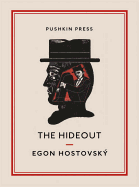
This new edition of Egon Hostovský's The Hideout, translated by Fern Long, rediscovers the depth and humanity of a great Czech writer.
First published in 1945, The Hideout belongs in the canon of classic 20th-century literature. Hostovský (The Arsonist) was born to a large Jewish family in Czechoslovakia and had to flee both Nazis and Communists. His work helped shape Central European literature. The Hideout is a short epistolatory novel in which a Czech engineer who's fled to France at the outbreak of World War II writes to his estranged wife in his last days. Hiding from German occupiers in his friend's dark cellar, the engineer suffers bouts of madness and nostalgia, trying to make sense of life and death. He composes the letter as he prepares for a suicide mission with the French Resistance.
The Hideout is an important work of existentialism that recalls Albert Camus's The Stranger and Jean-Paul Sartre's Nausea in terms of probing the reality of self-knowledge and the nature of good and evil. Though dark, the novel has a poetry all its own. It contains awe-inspiring passages and a wondrous mysticism. Before the Nazi invasion, the engineer writes of the "invincible merriment" and "bleating voluptuousness" of Parisian life. Even later in his abysmal hiding place, his mind hearkens back to his childhood and "all the roads which lead to the springs of life," where "God still lives and from its wells you can draw living water."
The Hideout is not without horrifying moments of violence, but it offers a glimpse of transcendence while shaking one to the core. --Scott Neuffer, writer, poet, editor of trampset

